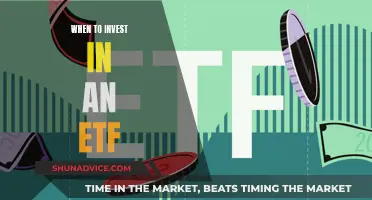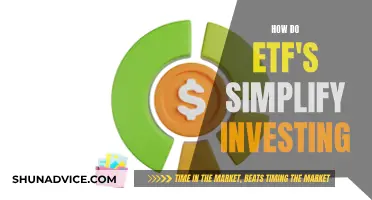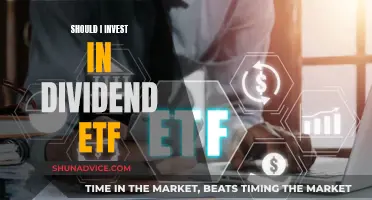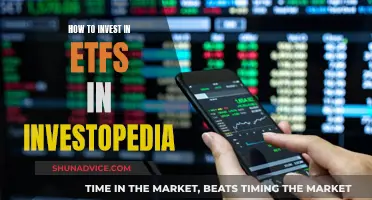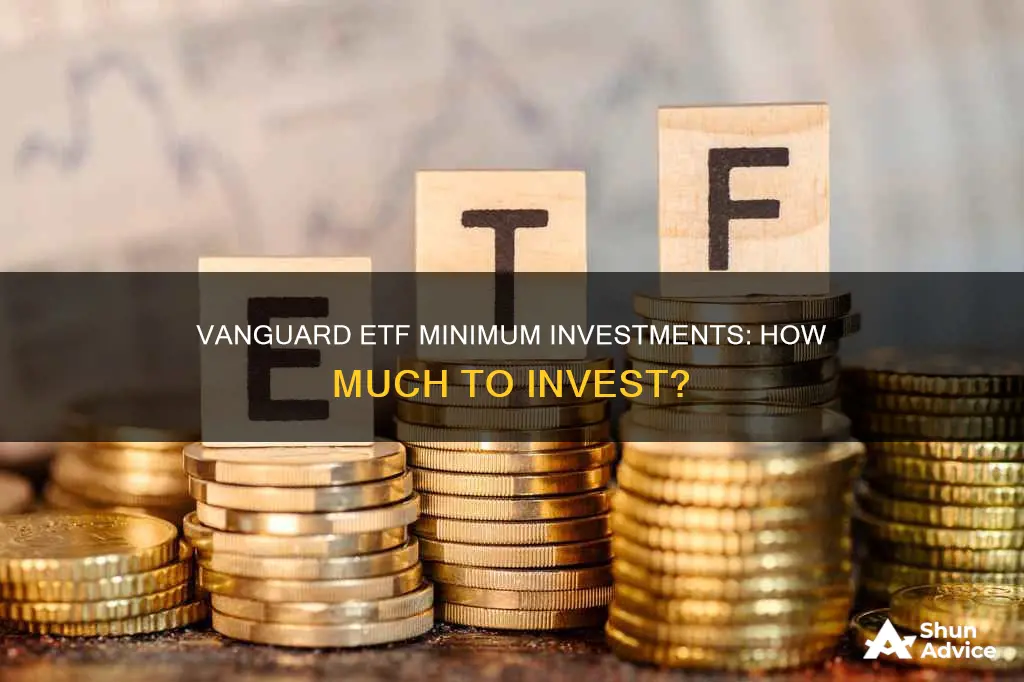
Vanguard is a major investment management firm serving more than 30 million investors and offering 410 funds worldwide. The company offers mutual funds, exchange-traded funds (ETFs), and bonds. While Vanguard's mutual funds have minimum investment requirements, its ETFs do not. This is because ETF shares are traded and treated like any other stock. Although there is no minimum dollar amount for Vanguard ETFs, the minimum investment is the cost of one share, which can be as little as $1 or $50, depending on the ETF chosen. Share prices fluctuate, so it's important to check the current market price before investing. It's worth noting that Vanguard also charges account service fees, which range from $15 to $25 annually, depending on the type of account.
| Characteristics | Values |
|---|---|
| Minimum initial investment | No minimum initial investment requirement |
| Minimum account balance | No minimum account balance |
| Account service fees | $15 to $25 per year |
| Commission fees | $0 |
| Minimum investment | Cost of one share |
What You'll Learn

No minimum initial investment
When it comes to Vanguard ETFs, there is no minimum initial investment requirement. This means that you don't need a large sum of money to start investing in a Vanguard ETF—you can buy a Vanguard ETF for as little as $1. The only minimum investment requirement is the cost of one share, and depending on the ETF chosen, one share could cost as little as $50. For example, as of September 30, 2024, the share price of Vanguard's VTIP ETF, reflecting short-term inflation-protected securities, was $49.31. On the other hand, VOO, Vanguard's ETF that tracks the S&P 500, had a share price of $527.67.
Vanguard ETFs are known for their low expense ratios, which is the annual operating expense of a fund, expressed as a percentage of the fund's average net assets. Vanguard's average ETF expense ratio is significantly below the industry average, making it a competitive option for investors.
It's important to note that while there is no minimum dollar amount for Vanguard ETFs, share prices can fluctuate, so the minimum investment is the cost of one share at the current market price. This can vary depending on the specific ETF and market conditions.
Vanguard also offers other investment options, such as mutual funds and bonds, which may have different minimum investment requirements. It's always important to review the prospectus and consider all fees, fund features, and investment objectives before making any investment decisions.
A Beginner's Guide to S&P 500 ETF Investing
You may want to see also

No minimum account balance
When it comes to Vanguard ETFs, there is no minimum account balance. This means that you can start investing with as little as the cost of one share, which could be as low as $50 or even less, depending on the ETF you choose. For example, as of September 30, 2024, the share price of Vanguard's VTIP ETF, reflecting short-term inflation-protected securities, was $49.31.
The absence of a minimum account balance requirement makes Vanguard ETFs accessible to a wide range of investors, as you only need enough money in your settlement fund to cover the cost of the ETFs you want to purchase. This flexibility can be particularly advantageous for those who are just starting their investment journey or those who want to invest in multiple ETFs without committing a large sum of money upfront.
It is worth noting that while there is no minimum dollar amount required, the minimum investment is the cost of one share. Share prices can fluctuate, so it is important to review the current share price of the ETF you are interested in before making a purchase. Additionally, keep in mind that there may be other fees associated with maintaining a Vanguard account, such as annual account service fees, which typically range from $15 to $25.
By eliminating the need for a minimum account balance, Vanguard provides investors with greater flexibility and accessibility, allowing anyone to start investing in ETFs without a large initial investment. This approach aligns with Vanguard's commitment to offering competitive and low-cost investment options to its clients.
ETFs: Real Investments or Just a Fad?
You may want to see also

Share prices fluctuate
The Vanguard VTIP ETF is an example of a Vanguard ETF with a low minimum investment requirement. The fund seeks to provide investors with inflation protection by investing in short-term inflation-protected securities. The VTIP ETF has a low expense ratio of 0.04%, making it a cost-effective option for investors.
Vanguard's VOO ETF, on the other hand, tracks the S&P 500 index and provides investors with exposure to 500 of the largest U.S. companies. The VOO ETF has a higher share price than the VTIP ETF but also offers the potential for higher returns.
It is important to note that share prices can vary across different Vanguard ETFs, and investors should carefully consider their investment objectives, risks, charges, and expenses before investing. Additionally, investors should be aware that all investments carry risk, and the value of their investment will fluctuate over time.
ETFs: The Future of Passive Investing?
You may want to see also

Account service fees
Vanguard charges an annual account service fee that is deducted from your account to cover the cost of maintaining the account. These fees range from $15 to $25 depending on the type of account you own. For example, Vanguard Brokerage Services® charges a $25 fee for each brokerage account, but this fee is waived if a client's total qualifying Vanguard assets are at least $5 million. Similarly, Vanguard charges a $25 fee for each Vanguard mutual fund, which is waived if you have at least $5 million in qualifying Vanguard assets.
You can avoid paying account service fees by signing up for e-delivery, which means you will receive an email when your account documents are available on their secure website instead of waiting for them to arrive by mail. Additionally, Vanguard Brokerage Services does not charge the fee to clients with an organization or trust account registered under an employee identification number (EIN) or clients enrolled in an advisory program serviced by a Vanguard affiliate.
It is important to note that Vanguard funds never charge front-end or back-end loads, and you can trade Vanguard and non-Vanguard ETFs and mutual funds commission-free online. However, most clients will have to pay a commission if they choose to trade by phone.
BRICS ETF: A Smart Investment Strategy for Global Diversification
You may want to see also

Other costs associated with ETFs
Vanguard does not charge a minimum investment fee for its ETFs. However, there are other costs associated with ETFs that investors should be aware of. These include:
- Account service fees: Vanguard charges an annual fee ranging from $15 to $25, depending on the type of account. This fee is deducted from your account to cover the cost of maintaining it.
- Bid-ask spreads: The bid-ask spread is the difference between the highest price a buyer is willing to pay for an ETF (the bid price) and the lowest price a seller is willing to accept (the ask price) at a specific time. For Vanguard ETFs, the spreads typically range from $0.01 to $0.25 but may be wider in volatile markets.
- Expense ratios: Every ETF has an expense ratio, which reflects the cost of portfolio management, administration, marketing, and distribution. Vanguard's average ETF expense ratio is 0.05%, significantly lower than the industry average of 0.22%.
- Purchase and redemption fees: While Vanguard ETFs do not charge these fees, some other ETFs may charge a fee when you buy or sell shares or within a specific time frame to discourage short-term trading.
- Sales fees: Some ETFs charge a sales fee, also known as a load, when you buy or sell fund shares. This can impact your investment returns.
- Management and transaction costs: ETFs may have management and transaction costs associated with actively managed funds, which can impact the overall return on your investment.
Millennials: The ETF Generation?
You may want to see also
Frequently asked questions
There is no dollar value minimum investment for Vanguard's ETFs, but the minimum investment for any market participant is the cost of one share. Share prices fluctuate and can cost as little as $1 or $50.
Investors make an initial minimum investment — typically around $3,000 — and pay annual costs to maintain the fund, known as an expense ratio, based on a small percentage of your cash invested in the fund.
There are no account service fees for retail brokerage accounts. Vanguard funds never charge front-end or back-end loads. However, some funds charge a fee when you buy and sell shares, which can range from 0.25% to 1.00% of the transaction amount.
Vanguard ETFs are popular due to their low expense ratios, low turnover ratios, low tracking errors, and superior investment sampling methodology. They also offer a wide spectrum of investment objectives.


